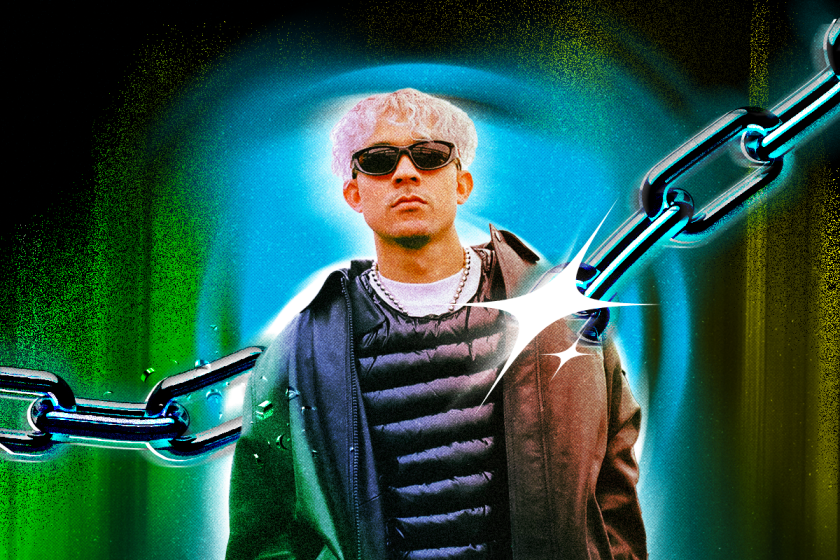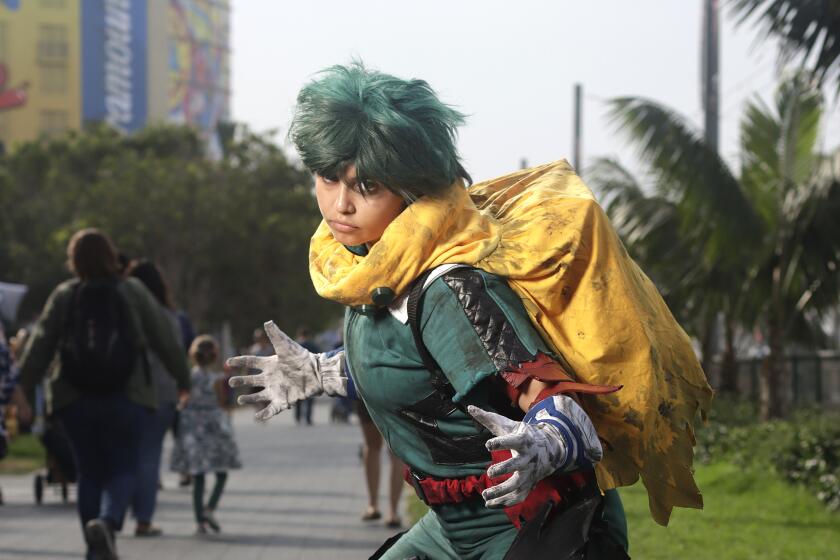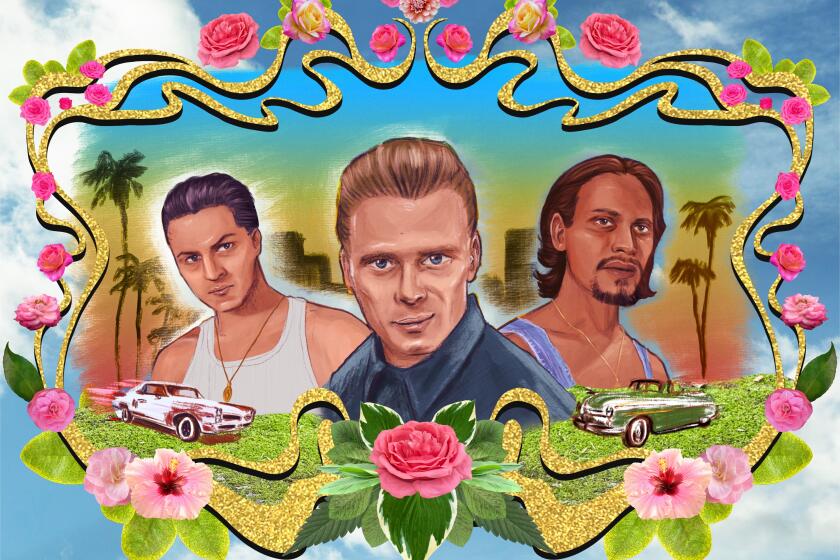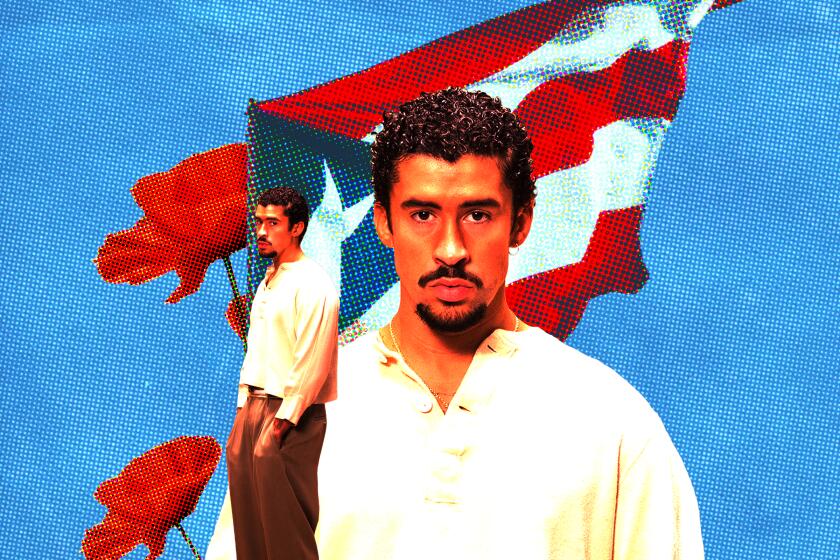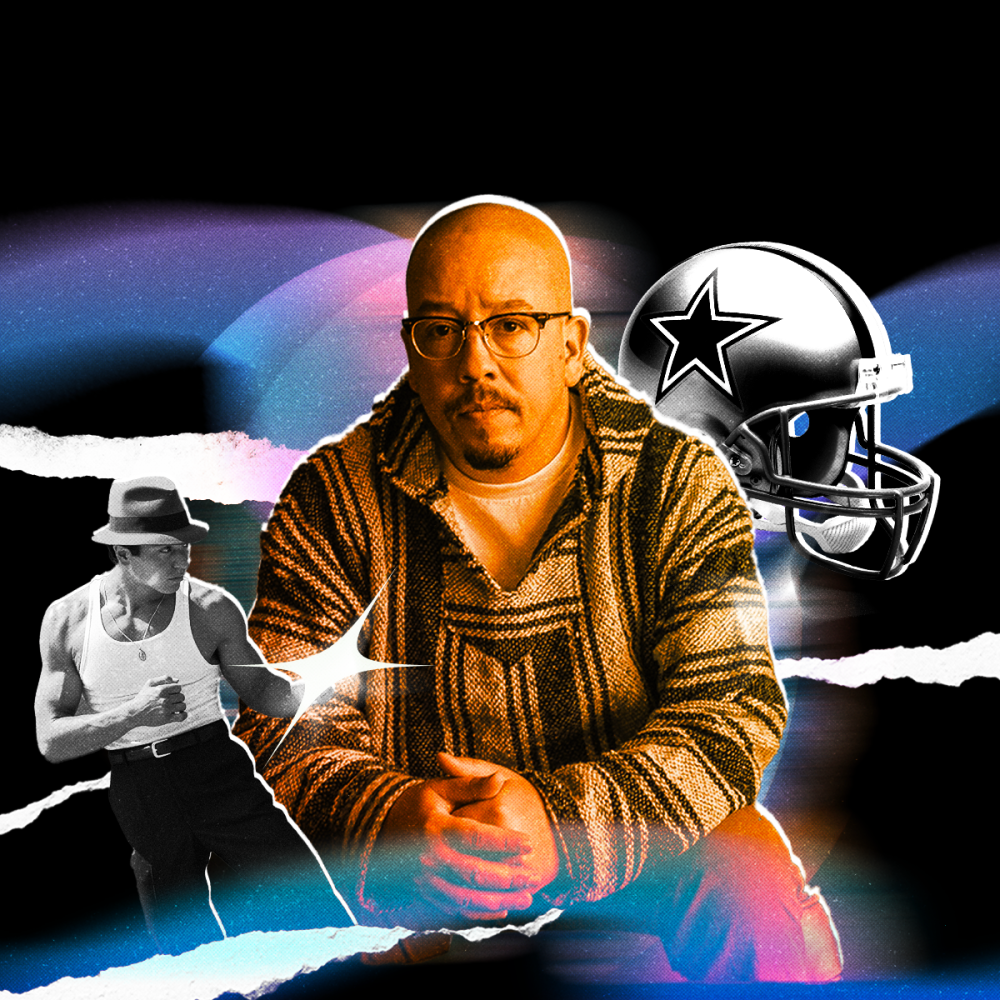
)
Shea Serrano is a busy man.
In addition to being a four-time New York Times bestselling author, the San Antonio native is also the creator and showrunner of “Primo,” the critically beloved sitcom that premiered on Amazon Freevee on May 19. Next month, Hulu will release “Miguel Wants to Fight,” a coming-of-age comedy that Serrano co-wrote with Jason Concepcion.
On Wednesday, Serrano self-published “Action Hero Scouting Report,” which is exactly what it sounds like — 27 action heroes are graded on six categories and given an action hero score. We caught up with the multi-hyphenate on the heels of this release to talk sports, television and movies, the strike by members of the Writers Guild of America and other things.
The following interview has been lightly edited for clarity.
From working with Bad Bunny to being inspired by anime, Tainy takes us behind his new album, ‘Data.’
I’ll start with an easy one. Which of these teams is the most Latino team and why: the Dallas Cowboys, the Las Vegas Raiders, the Los Angeles Dodgers or the San Antonio Spurs?
Oh, man. You know who I thought was going to be in there? The San Diego Padres.
Oh, really? Interesting.
Yeah, I’m surprised the Padres aren’t on that list, mainly because any time I post a picture of food that I’ve picked up in San Antonio — it’s Tex Mex here, it’s my favorite type of food — with the caption “Mexicans are perfect,” I don’t know how it gets to them, but Padres Twitter goes nuts. They get mad every single time I do it. I just assumed the Padres have a very large Latino fan base, so I’m surprised they’re not on that list. Make sure you mention those guys over there.
If I have to pick out of those four teams, it’s got to be the Dallas Cowboys. But then again, I’m in Texas. They’re among the most valuable franchises in the history of the world. But, man, Mexicans love the Cowboys so much. My dad is a Cowboys fan. Pretty much everybody in the family is a Cowboys fan. It’s a lifestyle — the jean shorts, the Jordans, the fade and the Emmitt Smith or Dez Bryant jerseys. It’s a whole thing here in Texas. It’s incredible.
Speaking of, what’s your favorite Mexican or Tex-Mex spot and what’s your order?
In San Antonio, it’s this place called Mendez Cafe. They’ve been open for decades, and I’ve been going there for 30 years. I get the same thing every single time I go: a bean and cheese taco, a carne guisada and cheese taco, a migas plate and a Big Red. I literally just had that for breakfast yesterday.
What about elsewhere? Outside of San Antonio?
You know what happens every time I go somewhere? If I’m on a book tour or something, I’ll tweet, “I’m in Denver for the night,” and somebody will always reply with, “Let me take you to where the best tacos in Denver are.” We have the best tacos in the world in San Antonio. Why would I go somewhere else and eat tacos that aren’t that? Other cities tend to have a food they’re really known for, so if I go to that city, that’s what I’m eating.
As a Rio Grande Valley native [Editor’s note: puro 956, cuh!], I take some issue with that claim about San Antonio, but y’all aren’t Austin, so I’m going to let it slide.
Haha.
What about L.A., though?
L.A. doesn’t do Tex-Mex. L.A. does a whole different thing, so when I go there, I eat that version of Mexican food — the white cheese version of Mexican food, not the yellow cheese version.
It is interesting that people tie where they’re from to their concept of what it’s like being Mexican or Latino. It’s cool in a way because it shows you that we’re pretty much everywhere. On the flip side, it creates a situation in which if someone doesn’t meet those specific parameters, their experience is invalidated. What’s your take on that?
I don’t think you have to do that. In fact, I think, ultimately, you should not do that. Just do the stuff that you like to do, be the way that you like to be and that’s it. You don’t have to say everything out loud.
Whenever I do interviews, the reporter will usually say, “I really want to talk about what it’s like to be Latino in publishing or in journalism,” which is cool, but we could talk about other stuff too. You don’t have to talk about it all the time. You can just exist in the world. Subtext says a lot.
San Diego Comic-Con did not have its usual panel discussions for upcoming movies and shows as the writers’ and actors’ strikes continue. For many fans, that did not deter them from doing the time-honored tradition of dressing up as their favorite characters.
You’re not only an accomplished author but you also have a well-reviewed sitcom (“Primo”) and a movie (“Miguel Wants to Fight”) about to be released. Latino representation in media as a whole is obviously severely lacking, which makes you an exception to the rule. My question is: How did you do it?
You just get lucky. A lot of it is just that. Of course, you hope that the ideas you’re pitching are good and you work hard, but for the most part, it’s all about luck.
Back in 2011, Bill Simmons, the most successful sports journalist that’s ever lived, launched Grantland. The place was journalism heaven. Everybody wanted to work there. In 2013, he reached across the internet and touched me on the forehead and said, “Now he writes for us.” As soon as he did that, everything changed. Because this one person said, “What this guy is doing is valuable,” people who had ignored me, who hadn’t returned my emails or who’d turned down all my pitches, all of a sudden were saying things like, “Hey, you should come write for us as well.”
It really is a matter of luck. If [Simmons] doesn’t do that, then who knows what the road looks like from there? You obviously try to work hard, write well and study and be respectful of the craft. You can do everything the right way, but if you don’t get lucky — and sometimes you have to get lucky several times — then it might not work out.
Something you didn’t mention, and I’m sure you’ve experienced this as well, is that when you try to build a career like this, what rarely gets discussed is the times you miss — you really tried and it didn’t work out. You have to f— up a bunch of times before you figure it out. It’s important to mention the failures, because it’s very easy when you’re on the internet to look across and think, “Man, every time I see Fidel post something, it’s this great thing he’s doing at the L.A. Times.” But I don’t ever see all the stuff that didn’t make it, all the times you’ve had your heart broken.
I think it’s important that you pay it forward. Bill [Simmons] helped me out when he didn’t have to. My first real editors were this guy named Chris Gray and a woman named Margaret Downing over at the Houston Press. I had never really written anything at all, but they decided that they were going to spend some of their time teaching me. The person who put me in publishing is a woman named Samantha Weiner. I had never written a book before, and she opened that door for me. There’s always somebody who’s helping out, and I feel like I have a responsibility to do the same thing as often as I can.
Since we’re on the subject, who are some writers or creators whose work you enjoy and who audiences should know about?
There are so many really great young writers out there, which is an exciting thing for me because I love to read great writing, but also a terrifying thing for me because every time I read something really good I’m like, “F—, I’m toast. I can’t keep up with this person.”
Anyway, here are just a few of my favorites, and let me clarify that when I say “young writer” what that means is “younger than me”: Hunter Harris, who is one of the funniest writers working today; J.P. Brammer, who always has one or two sentences in his pieces that feel like he wrote them with a lightning bolt; Doreen St. Félix, who is so incredibly good at peeling back the pieces of a moment to reveal some sort of truth you never saw coming; and Julyssa Lopez, who has a real gift for dropping the reader into a moment and into a feeling and into an emotion. Again, that’s just a few — there are so many out there — but there you go.
You wrote a column for The Times about having a show premiere during the strike. What has been your experience being so removed from the epicenter of these actions taking place in New York and L.A.?
It’s so weird to watch it play out from so far away because there’s instinct to do as much as you can to help. If there’s a fundraiser going on, I can share that. I can donate here and there.
Still, it’s hard to watch your friends out on the picket lines, Peter Murrieta, for example. He’s somebody who I really look up to and whose insights I respect a lot. He’s probably out there every single day. Sylvia Batey Alcalá, Alex Zaragoza [Editor’s note: Full disclosure, Zaragoza is a regular De Los contributor], Jason Conception — I’m watching all my friends be out there in the front lines. I was able to fly out to L.A. a couple of weeks ago and participate in the strike. Walking around with picket signs and doing the chants, it really does make you feel like you’re part of a community. When you’re separated in the way that I am or in the way that people who aren’t in New York or L.A. are, it’s easy to feel dispirited. But then you go out there, you realize that it’s a big, long fight and that our team is really strong.
One of the consequences of not having our stories reflected in media is that we tend to grab on to certain shows, things or characters and claim them as our own. A friend of mine, for example, has made the argument in the past that Goku from “Dragon Ball Z” is Mexican. With that in mind, who else, real or fictional, do you think qualifies as a non-Mexican Mexican, and why?
Oh, man, I feel like I have written this down somewhere in the Notes app. it’s always a tricky game to play, to be like, “LeBron is Mexican because of his Taco Tuesday thing.” Are you denying that person’s identity when you do that?
If we’re picking fictional characters, I think Scorpion from the “Mortal Kombat” series is probably Mexican, just based on the way that he fights — he’s just like a real mad dude with a real bad temper who sets things on fire. I’ll go with him if we’re going with the most basic stereotypes about Mexicans or Latinos. Oh, what about “Predator?” The planet where he’s from, that’s probably a Mexican planet.
Honestly, that’s a pretty good one. The Predator is someone who learns from their environment and adapts, and what is Mexican culture if not adapting and adopting? Take the accordion. That’s something that was brought over from the Germans and the Polish, but Mexicans took it and made it their own.
Let’s stick to movies. What would be in your Mt. Rushmore of Latino cinema?
I have to have “Blood in Blood Out.” I’m sitting at my desk right now and directly behind me is a hand-drawn picture of “Selena.” You said Mt. Rushmore, right? So I get only four?
The film stumbled at the box office 30 years ago but was saved from obscurity by Latino audiences, who reclaimed it as a cornerstone of their representation in cinema.
Yep.
OK, I’m going to try to go with different styles of movies. Give me “Desperado,” one of the greatest action movies ever. For my last one, I feel like it should be “American Me,” but that’s off the table because I already have “Blood in Blood Out,” and they both branched from the same idea. I’m torn between “Stand and Deliver” and “Mi Vida Loca.” I think I’m going to go with Mousie and Sad Girl — give me “Mi Vida Loca” for the final spot. I feel good about that.
Done. Final question: Jaime Jaquez Jr.?
That’s the question?
Haha, yeah.
That’s the best question I’ve been asked in six weeks. He’s just the best, man. I was so happy when the Miami Heat drafted him. I was secretly hoping that he’d fall to the Spurs but there was no way that was going to happen. I have a Jaquez UCLA jersey in my office right now. I have a buddy whose wife works at UCLA and I had to call in a favor because I needed to have one of those jerseys. I’m so excited to watch him play this year.
Our Mexican basketball team is looking really strong. We have Jaquez. We have Devin Booker. We have Juan Toscano-Anderson. This reminds me of the question you asked earlier [about non-Mexican Mexicans], because I was just talking to someone about this, and I put Kyrie Irving on my list because he wore Nike Cortezes to a game once.
That kind of tracks. He believes in conspiracy theories, which a lot of Mexican Americans also do.
Oh my God, they go nuts! [Laughs.]
But yeah, I love Jaquez. I’m so excited to watch him play when the Heat come to San Antonio this year. I’ll be sure to be in attendance for that one. I did the same thing when Phoenix came when we first moved back to San Antonio.
Have you heard some of the nicknames people have been giving to Jaquez?
I have not. Tell me.
The two I’ve heard that were pretty good were “Bam Adobado” and “Mex Strus.”
Oh man, those are really good.
Yeah, there’s a bunch of them circulating online. Personally, as a Mexican, I’m very excited that we’re moving forward as a people, that we are now seen as capable of dunking.
I remember when I was a kid, my uncle straight up told me, “Uh, you should not play basketball. You should play baseball because at least there’s a chance there.”
I replied with, “No. I’m going to be in the NBA one day, trust me.” I did not make it. I didn’t even make it through high school basketball. It turns out I wasn’t that good.
More to Read
The Latinx experience chronicled
Get the Latinx Files newsletter for stories that capture the multitudes within our communities.
You may occasionally receive promotional content from the Los Angeles Times.

